
About Foundation Plant Services
Foundation Plant Services
- Produces, tests, maintains and distributes elite disease-tested plant propagation material
- Provides plant importation and quarantine, disease testing, virus elimination, and DNA identification services
- Coordinates release of UC-patented horticultural varieties
- Links researchers, nurseries and producers
Foundation Plant Services (FPS) was established in 1958 to distribute virus-tested, professionally identified grape, fruit and nut tree propagation stock. Selections originated from University of California (UC) and United States Department of Agriculture (USDA) variety improvement programs. UC faculty and California Department of Food and Agriculture (CDFA) scientists developed indexing techniques for detection of the most common virus diseases affecting production of these crops in California. Today, FPS has programs for grapes, strawberries, fruit and nut trees, roses, and sweet potatoes. The department is housed in the National Grapevine Importation and Clean Stock Facility, which was built with federal, state and industry funds in a cooperative effort to strengthen FPS programs. FPS works closely with CDFA to register and certify grapevines, fruit and nut trees, and strawberry plants. FPS research programs develop new techniques for disease detection and elimination to improve the quality of propagation materials.
UC provides the infrastructure and faculty support to FPS; operating expenses are provided from the agricultural communities served by FPS, through purchase of plant material, user fees, and contributions from industry funding agencies. The programs are primarily focused on the sale of disease-tested propagating stock to nurseries.
The Grape Program
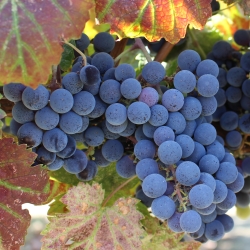 Severe virus disease problems in California vineyards during the 1950s spurred UC and USDA scientists to develop methods for grape virus disease detection and disease elimination. A large collection of disease-tested wine, table, raisin and rootstock grape selections was created which became the foundation for the California Grapevine Registration & Certification (R&C) Program. The current 100-acre Foundation Vineyard was established on fumigated soil in an isolated location. Vines are inspected and retested regularly by FPS and CDFA. FPS is the source of California Registered or Certified grapevines. Today, FPS is the only dedicated grape importation facility in the United States. Highly sought-after foreign grape selections are processed through quarantine for the grape and wine industries. Testing normally requires two years, but if virus diseases are found, therapy and retesting may take much longer. After planting in the Foundation Vineyard, several years may be needed for the vines to produce fruit for professional identity verification.
Severe virus disease problems in California vineyards during the 1950s spurred UC and USDA scientists to develop methods for grape virus disease detection and disease elimination. A large collection of disease-tested wine, table, raisin and rootstock grape selections was created which became the foundation for the California Grapevine Registration & Certification (R&C) Program. The current 100-acre Foundation Vineyard was established on fumigated soil in an isolated location. Vines are inspected and retested regularly by FPS and CDFA. FPS is the source of California Registered or Certified grapevines. Today, FPS is the only dedicated grape importation facility in the United States. Highly sought-after foreign grape selections are processed through quarantine for the grape and wine industries. Testing normally requires two years, but if virus diseases are found, therapy and retesting may take much longer. After planting in the Foundation Vineyard, several years may be needed for the vines to produce fruit for professional identity verification.
The Strawberry Program
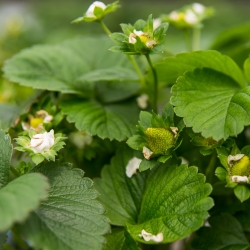 For many years, the Department of Pomology at UC Davis has been the home of one of the world's most successful strawberry breeding programs. FPS supports the UC breeding program and the UC Office of Technology Transfer, which licenses these cultivars, by maintaining a collection of the current UC patented cultivars. The collection receives annual testing for virus diseases and genetic identity. Both plants and tissue culture meristem tip explants are distributed by FPS to UC licensees. In addition, FPS tests and maintains advanced breeders' selections produced by UC strawberry breeders, ensuring smooth release of disease-tested propagating stock when new cultivars are introduced. Importation, quarantine and virus therapy services are also available for non-UC varieties.
For many years, the Department of Pomology at UC Davis has been the home of one of the world's most successful strawberry breeding programs. FPS supports the UC breeding program and the UC Office of Technology Transfer, which licenses these cultivars, by maintaining a collection of the current UC patented cultivars. The collection receives annual testing for virus diseases and genetic identity. Both plants and tissue culture meristem tip explants are distributed by FPS to UC licensees. In addition, FPS tests and maintains advanced breeders' selections produced by UC strawberry breeders, ensuring smooth release of disease-tested propagating stock when new cultivars are introduced. Importation, quarantine and virus therapy services are also available for non-UC varieties.
The Tree Program
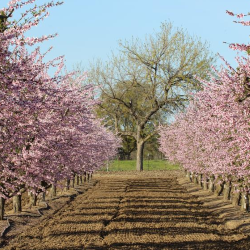 The Foundation Orchard includes varieties of almond, apricot, cherry, nectarine, peach, plum and rootstocks. FPS works with researchers and members of the fruit and nut tree industry in developing and introducing new materials originating from breeding programs, domestic and foreign public collections and private plantings. Trees are tested and treated to eliminate disease and then professionally identified to qualify them for planting in the FPS Foundation Orchard. Regular serological and bioassay tests and twice-a-year visual inspections retain the CDFA certified status of the trees. FPS sells dormant and green cuttings as well as rootstock seed.
The Foundation Orchard includes varieties of almond, apricot, cherry, nectarine, peach, plum and rootstocks. FPS works with researchers and members of the fruit and nut tree industry in developing and introducing new materials originating from breeding programs, domestic and foreign public collections and private plantings. Trees are tested and treated to eliminate disease and then professionally identified to qualify them for planting in the FPS Foundation Orchard. Regular serological and bioassay tests and twice-a-year visual inspections retain the CDFA certified status of the trees. FPS sells dormant and green cuttings as well as rootstock seed.
The Rose Program
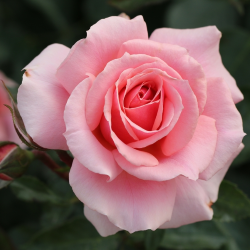 In an effort to reduce the damaging effects of virus infection on rose plants, a program of virus detection and elimination was initiated at FPS in the 1960s. Roses which tested negative for rose mosaic virus were planted in a special collection. This collection proved valuable to the rose nursery industry in its efforts to improve the quality of its stock. In the mid-1990s with industry support, FPS expanded the original block of virus-indexed plants to 8 acres the largest collection of clean stock roses in the U.S. today. The garden is inspected twice annually and is regularly tested by bioassays, serological and molecular tests. Scion budwood and understock canes are made available as a source of disease-tested material to establish healthy cutting blocks for commercial production. All America rose selections are automatically sent to FPS for inclusion in the collection.
In an effort to reduce the damaging effects of virus infection on rose plants, a program of virus detection and elimination was initiated at FPS in the 1960s. Roses which tested negative for rose mosaic virus were planted in a special collection. This collection proved valuable to the rose nursery industry in its efforts to improve the quality of its stock. In the mid-1990s with industry support, FPS expanded the original block of virus-indexed plants to 8 acres the largest collection of clean stock roses in the U.S. today. The garden is inspected twice annually and is regularly tested by bioassays, serological and molecular tests. Scion budwood and understock canes are made available as a source of disease-tested material to establish healthy cutting blocks for commercial production. All America rose selections are automatically sent to FPS for inclusion in the collection.
The Sweet Potato Program
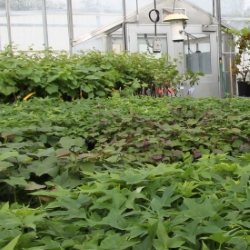 In the 1960s, California sweet potato growers faced a serious problem with russet crack disease of sweet potatoes. A program was developed by UC Davis plant pathologists to provide growers with virus-tested sweet potato stock. In 1995, the program was transferred from the UC Department of Plant Pathology to FPS. The collection of sweet potato mother plants is maintained as large, potted plants in a greenhouse. These plants originate from stock that is treated by tissue culture therapy to eliminate viruses, tests negative for virus diseases and is selected for desirable agronomic characteristics. Each spring, FPS produces thousands of rooted cuttings of this stock for planting by growers.
In the 1960s, California sweet potato growers faced a serious problem with russet crack disease of sweet potatoes. A program was developed by UC Davis plant pathologists to provide growers with virus-tested sweet potato stock. In 1995, the program was transferred from the UC Department of Plant Pathology to FPS. The collection of sweet potato mother plants is maintained as large, potted plants in a greenhouse. These plants originate from stock that is treated by tissue culture therapy to eliminate viruses, tests negative for virus diseases and is selected for desirable agronomic characteristics. Each spring, FPS produces thousands of rooted cuttings of this stock for planting by growers.
Custom Laboratory Testing Services
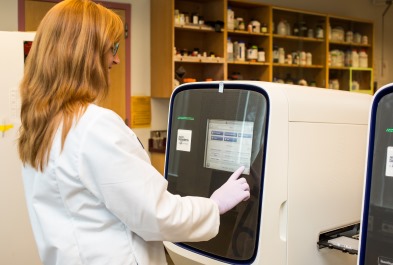 Disease testing services using polymerase chain reaction (PCR) technology is available at FPS for 16 pathogens of grapes and 5 pathogens of fruit and nut trees. PCR is a highly sensitive test that has been optimized at FPS for both grape and tree pathogens. Foundation Plant Services also provides variety identification using DNA Fingerprinting technology for grape, tree crops and strawberry. To identify the variety, the DNA profile of the client's sample is compared to a reference database that is specific to each fruit or nut crop. Our databases contain the important varieties grown in the United States. We provide excellent customer service and a turnaround time of three to four weeks.
Disease testing services using polymerase chain reaction (PCR) technology is available at FPS for 16 pathogens of grapes and 5 pathogens of fruit and nut trees. PCR is a highly sensitive test that has been optimized at FPS for both grape and tree pathogens. Foundation Plant Services also provides variety identification using DNA Fingerprinting technology for grape, tree crops and strawberry. To identify the variety, the DNA profile of the client's sample is compared to a reference database that is specific to each fruit or nut crop. Our databases contain the important varieties grown in the United States. We provide excellent customer service and a turnaround time of three to four weeks.


